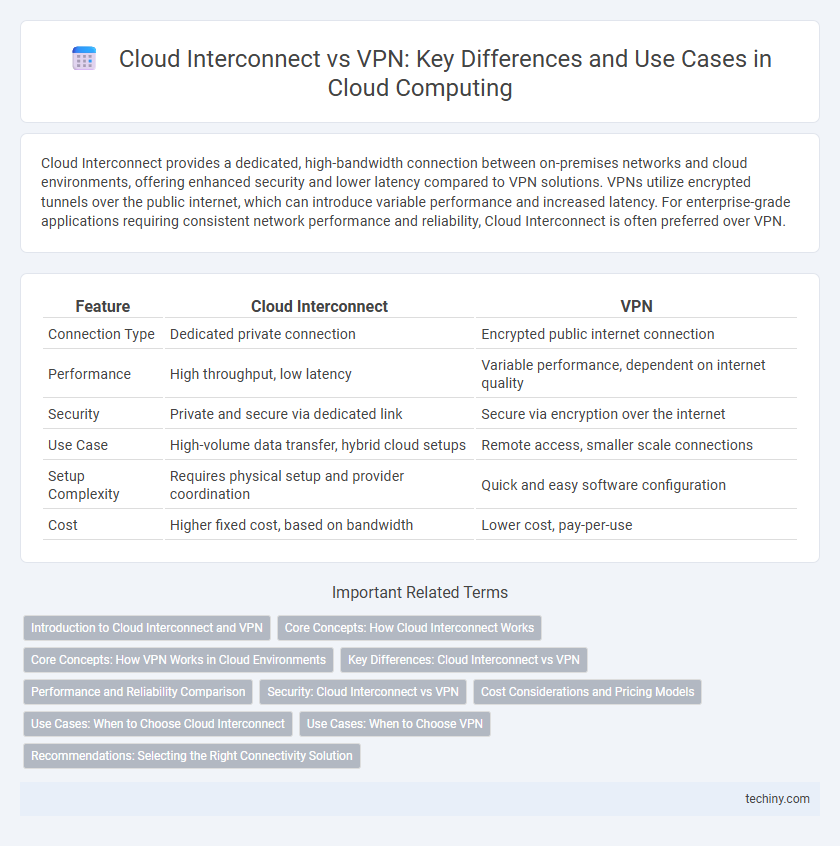Cloud Interconnect provides a dedicated, high-bandwidth connection between on-premises networks and cloud environments, offering enhanced security and lower latency compared to VPN solutions. VPNs utilize encrypted tunnels over the public internet, which can introduce variable performance and increased latency. For enterprise-grade applications requiring consistent network performance and reliability, Cloud Interconnect is often preferred over VPN.
Table of Comparison
| Feature | Cloud Interconnect | VPN |
|---|---|---|
| Connection Type | Dedicated private connection | Encrypted public internet connection |
| Performance | High throughput, low latency | Variable performance, dependent on internet quality |
| Security | Private and secure via dedicated link | Secure via encryption over the internet |
| Use Case | High-volume data transfer, hybrid cloud setups | Remote access, smaller scale connections |
| Setup Complexity | Requires physical setup and provider coordination | Quick and easy software configuration |
| Cost | Higher fixed cost, based on bandwidth | Lower cost, pay-per-use |
Introduction to Cloud Interconnect and VPN
Cloud Interconnect provides dedicated, high-bandwidth connectivity between on-premises networks and cloud environments, ensuring low latency and enhanced security for enterprise applications. VPN creates encrypted tunnels over the public internet, offering flexible and cost-effective remote access but typically with higher latency and variable performance. Both solutions enable secure cloud connectivity, but Cloud Interconnect is optimized for consistent, large-scale data transfer while VPN suits smaller-scale or temporary connections.
Core Concepts: How Cloud Interconnect Works
Cloud Interconnect enables private, high-bandwidth connections directly between on-premises networks and cloud providers, bypassing the public internet to enhance security and performance. It operates by establishing physical or virtual links that provide low-latency, dedicated connectivity, often leveraging technologies like MPLS or dedicated fiber optics. Compared to VPN, which encapsulates data over the public internet using encryption protocols such as IPsec, Cloud Interconnect ensures more consistent bandwidth and reduced jitter by maintaining a direct network path.
Core Concepts: How VPN Works in Cloud Environments
VPNs in cloud environments create secure, encrypted tunnels over public internet connections, enabling private communication between on-premises networks and cloud resources. By using protocols such as IPsec or SSL/TLS, VPNs authenticate endpoints and ensure data integrity and confidentiality during transmission. This method offers a cost-effective and flexible solution but may introduce latency due to internet routing, unlike dedicated Cloud Interconnect options.
Key Differences: Cloud Interconnect vs VPN
Cloud Interconnect offers a dedicated, high-bandwidth, low-latency connection between on-premises infrastructure and cloud environments, ensuring enhanced security and consistent performance for enterprise workloads. VPN relies on public internet pathways using encrypted tunnels, which may introduce variable latency and bandwidth limitations, making it suitable for less latency-sensitive applications. While Cloud Interconnect supports private network connectivity with scalable throughput, VPN provides a cost-effective and flexible solution for securing remote access over the internet.
Performance and Reliability Comparison
Cloud Interconnect offers higher performance with dedicated bandwidth and lower latency compared to VPN, which relies on the public internet. Reliability is enhanced in Cloud Interconnect through SLA-backed connections and private network paths, while VPNs may experience variable performance due to internet traffic fluctuations. Enterprises requiring consistent high throughput and uptime prefer Cloud Interconnect for mission-critical workloads.
Security: Cloud Interconnect vs VPN
Cloud Interconnect offers enhanced security by providing a private, dedicated connection between an on-premises network and a cloud provider, reducing exposure to the public internet and minimizing the risk of data interception. VPNs rely on encryption over the public internet but remain vulnerable to potential threats such as latency-induced packet loss or man-in-the-middle attacks. Enterprises requiring stringent security and consistent performance often prefer Cloud Interconnect for its robust, direct network linkage and lower attack surface.
Cost Considerations and Pricing Models
Cloud Interconnect typically incurs higher upfront costs due to dedicated physical connections, but offers predictable pricing models based on bandwidth and data transfer volumes. VPN solutions often have lower initial expenses, leveraging existing internet infrastructure, with costs primarily influenced by data usage and encryption overhead. Evaluating total cost of ownership requires analyzing traffic patterns, security needs, and scalability requirements between fixed Interconnect fees and variable VPN expenses.
Use Cases: When to Choose Cloud Interconnect
Cloud Interconnect is ideal for enterprises requiring high-throughput, low-latency connections between on-premises data centers and cloud environments, supporting workloads such as real-time data analytics and large-scale application migrations. It is preferred over VPN when consistent network performance, enhanced security, and dedicated connectivity are critical for hybrid cloud architectures or multi-cloud deployments. Organizations leveraging stringent compliance standards or requiring direct private connections to cloud providers benefit from Cloud Interconnect's guaranteed bandwidth and reliability.
Use Cases: When to Choose VPN
VPN is ideal for small businesses or temporary projects requiring secure, encrypted connections over the public internet without high costs or extensive setup. It suits remote workforce access, secure data transmissions, and quick deployments where physical infrastructure or constant high bandwidth is unnecessary. VPN's flexibility makes it perfect for low to moderate traffic environments demanding straightforward, cost-effective security solutions.
Recommendations: Selecting the Right Connectivity Solution
Choosing between Cloud Interconnect and VPN depends on factors such as bandwidth requirements, latency sensitivity, and security needs. Cloud Interconnect is recommended for enterprises needing high-throughput, low-latency connections with dedicated network performance guarantees, ideal for critical workloads and real-time applications. VPN suits smaller-scale or flexible connectivity demands, providing secure, cost-effective access over public internet without the need for dedicated infrastructure.
Cloud Interconnect vs VPN Infographic

 techiny.com
techiny.com